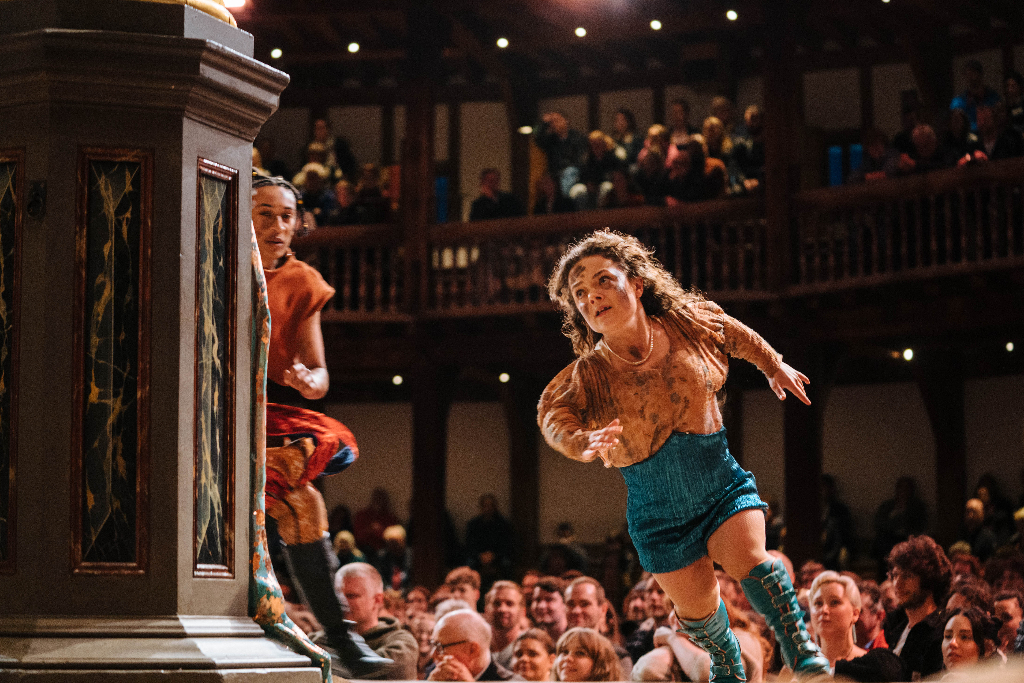Two years on from Sean Holmes’ production and seven on from Emma Rice’s (both of which featured diverse casts), Elle While takes a turn with the old warhorse’s lovers and fairies, its sparring couples and its Morecambe and Wise-like shambles of a play-within-a-play. The question hangs in the air – what to do to excite audiences, some of whom are so familiar with A Midsummer Night’s Dream that, a row behind me, they were laughing a beat before the punchlines were delivered?
The result of such consideration is a bit of a mishmash of things that work, some that don’t and quite a lot in-between, neverthless sufficient to get us from a forced marriage forestalled to three happy couples and a celebratory dance.
 Gender flipping and fluidity are very nearly de rigueur these days and often don't impact at all on our experience. Occasionally, too, such casting inevitably does compromise the drama as we recalibrate what we have known for decades.
Gender flipping and fluidity are very nearly de rigueur these days and often don't impact at all on our experience. Occasionally, too, such casting inevitably does compromise the drama as we recalibrate what we have known for decades.
The power of the opening scene, in which Hermia’s father demands death for her disobedience, was diluted by the brutal subjugation of a woman's will being delivered in the female vocal register. Sarah Finigan, with the air of an austere Calvinist about her costume and manner, is otherwise excellent, but the transactional nature of this man’s world, so clearly defined in her bargaining with Theseus, Duke of Athens (a Henry VIII-ish Jack Laskey), is watered down by the mismatched voices. What we hear is not what we see, no matter how much we buy into theatre’s essential artifice.
The approach to speech is a problem throughout in a venue in which the open roof allows both the ingress of noise from aeroplanes and the escape of sound from its stage. Too many lines get spoken too rapidly, which may make sense dramatically as passions run high. But it comes as something of a relief when the royals on show found the poetry in the line readings (Marianne Oldham also speaks beautifully as Queen Titania). Of course, that pace is embedded in their speeches, but a little sympathy for other characters’ pacing would help us process the nuance and beauty of words that have survived 400 years as much by luck as by judgement. They’re fragile in more senses than one.
Happily, other decisions pay off handsomely. Michelle Terry steps across the fourth wall, swapping her role as Artistic Director to that of Puck, the sprite whose transgressive caprice sets the lovers' confusions in motion. Looking like she has teleported straight out of Studio Ghibli’s world of nature / humanity crossovers, Terry is a compelling presence, bringing home the malevolence that is never far from the surface of a comedy with plenty of bite. The shadow of Covid crossed my mind too, the dreams having something of the reports of fevered sleep in the pandemic’s early days and Puck, like a virus, girdling the world in no time. Shakespeare knew only too well the human and financial cost of plague, so such parallels are hardly fanciful.
The four lovers are a little down on energy, Vinnie Heaven, Sam Crerar, Isabel Thom and Francesca Mills (pictured above with Sam Crerar) squabbling but not entirely convincing in their forays into the grip of love’s fearful passions. If we never grasp that they’re so much in love (and then so much not), it weakens Puck’s negligent error in their enchantment, so the stakes are diminished, Helena’s confusion and Hermia’s distress never burrowing deep into their souls.
That lowish-key backdrop does bring a sledgehammer force to the previous innocuous lines about Hermia’s shortness of stature. Mills was born with achondroplasia and is under four feet tall, so the insults flung at her take on an entirely different meaning than is usually the case. One sees, in an instant, that Hermia absolutely has to be fierce (on the inside as much as the outside) to survive in a world in which ableism is dispensed with such casual cruelty. Not unlike our own then.
How one takes Pyramus and Thisbe’s in-joke about a company of amateur actors putting on a show for a monarch (surely the preserve of The King’s Men after all?) probably depends on whether you’re seeing this for the first time or the twenty-first time, but it does give us the opportunity to enjoy a little more of Mariah Gale’s Nick Bottom, (Nicola Bottome in this production) as the over-enthusiastic tailor-cum-donkey-cum-tragedian. Gale is a delight whether braying like Lampwick in Pinocchio or pushing her character’s tiny talent beyond its natural boundaries, much to the chagrin of Rebecca Root’s decent but exasperated Peter Quince. A hat tip too to James Maloney, who provides some of the best music I’ve heard at this venue, gleefully played by a five-piece band.
With midsummer near enough to take the still lingering chill off London’s air, this production has plenty to admire in its boldness and inclusivity. Whether it quite gets to the depth of love or the viciousness of the feuding that drives the play is more open to question as you exit not so much a dream of a show as a hit-or-miss new vision of this ever-vivid play.















Add comment